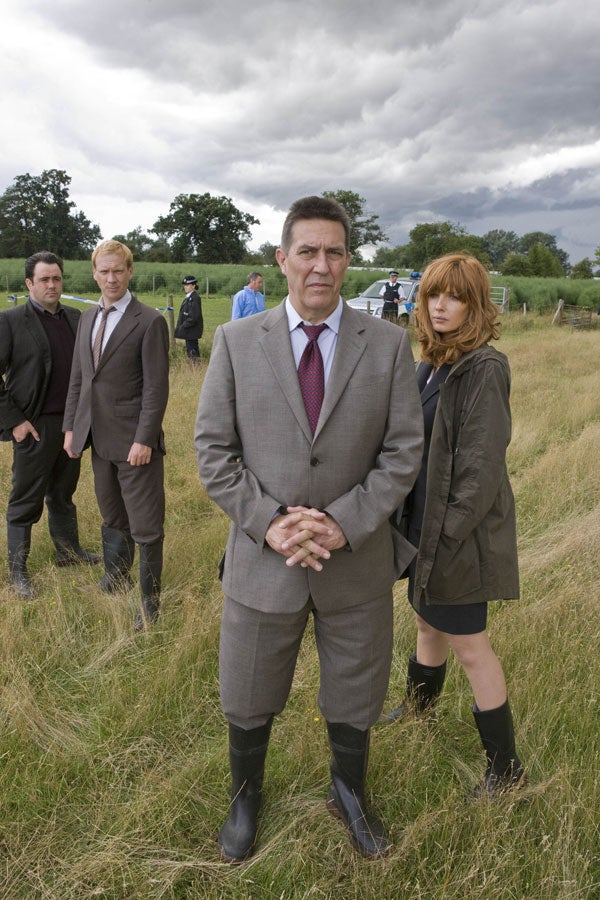Last Night's Television: Above Suspicion, ITV1<br />Horizon, BBC2

Lynda La Plante is a bit cross with the BBC, if a recent interview about their commissioning policy is a reliable guide. "If you were to go to the BBC," she reportedly said, "and say to them: 'Listen, Lynda La Plante's written a new drama, or I have this little Muslim boy who's just written one,' they'd say: 'Oh, we'd like to see his script.'" So I imagine she will have been gratified that the ratings for the first episode of Above Suspicion on Monday night handsomely capped those for the Hustle, back for another series on BBC1. If you think that ratings is the only thing that the BBC should be worried about then obviously the Corporation has cocked up here, failing to keep an important talent sweet. If you care about originality, though, you might conclude that BBC knew exactly what it was doing when it passed on one of her recent scripts. We can't know what the "little Muslim boy" would come up with, obviously, but then that's precisely the intriguing thing. Whatever it was it couldn't be as wearily predictable as La Plante's latest exercise in Chamber of Horrors police procedural.
As before, Ciaran Hinds played DCI James Langton, one of those blokey patriarchal coppers who's incapable of uttering a sentence without an exclamation mark attached to the end of it. "What kind of sick bastard would do all this!" he bellowed, surveying the crime-scene photographs of a surgically bisected woman, whose murder exactly replicates the notorious Black Dahlia killing in Los Angeles in 1947. Then he barked some more at his team members ("Come on! Move your arses!") and in particular at DC Travis, played by Kelly Reilly, and on hand here to generate tiny sparks of awkward sexual chemistry with her boss. The "tiny" isn't a comment on Reilly's generating power, incidentally. There are few actresses who can currently touch her for erotic wattage. It's just that the psychology of their notional attraction is so desultorily sketched in. You can almost see the Post-it note attached to the first draft: "Add some meaningful looks. Poss impulsive kiss in last scene?"
Not that anyone else was exactly hogging the psychological plausibility. The daily newspaper crime journalist who appeared in the first two episodes – to lead DC Travis astray – seemed particularly incredible, so incompetent that he hadn't taken the precaution of saving two anonymous letters from the killer, and so transparently creepy and self-serving that it was hard to imagine Travis would have let him into her flat, let alone her bed. And the eventual killer – a psycho toff with a taste for torture and incestuous sexual perversion – turned out to be a kind of nasty fairground cartoon. Curiously, his identity had been revealed at the end of episode two, shortly after Commander Jane Leigh had brilliantly profiled the mutilation murderer of two young girls as someone who might have "a hatred of women". The whodunit turned into a willtheycatchhim, a cliffhanger that only lasted as long as it did because every single police officer conveniently forgot that the suspect's house had been described as a place riddled with priest holes. "It's just so hard to believe... it's like bloody Houdini," muttered DC Travis in frustration, before the penny belatedly dropped and they uncovered their monster asphyxiated beneath the nanny's staircase. Hard to believe indeed. Bring on that little Muslim boy, I say.
Horizon informed us that there's been an "explosion in dog research", a phrase that conjured a ghastly image of an over-inflated basset hound blowing at the seams, but which actually referred to a number of investigations into the psychology and genetic origins of "man's best friend". One scientist surmised that we would never have got where we are today without the dog's assistance in turning us into agrarian societies. Another explained how the neat compartmentalisation of genes in modern dog breeds made them particularly useful in researching human illnesses, and yet another offered fairly persuasive evidence that dogs can read the facial expressions of their owners. There was quite a bit of doggy-devotional projection here ("Honestly, he knows just what I'm thinking"), but also plenty of genuinely intriguing science. I began to think of our dog with a little more respect than he generally musters from me. But then they showed you a dog genius from Austria, a border collie that has a vocabulary of around 300 words (name an object and he can fetch it from a jumbled pile of dog toys) and who – even more impressively – can be shown a photograph of an object and successfully fetch it from the next door room. Even dogs must have their Einsteins, I suppose, but I couldn't help but compare this noble animal with our own hairy slow learner. I just hope that I managed to keep the disappointment off my face when he next trotted into the room.
Subscribe to Independent Premium to bookmark this article
Want to bookmark your favourite articles and stories to read or reference later? Start your Independent Premium subscription today.

Join our commenting forum
Join thought-provoking conversations, follow other Independent readers and see their replies